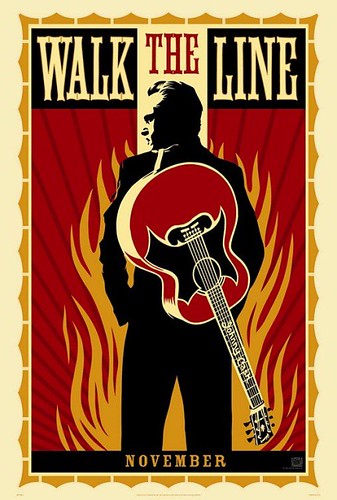
Starring Joaquin Phoenix, Reese Witherspoon, Ginnifer Goodwin, Dallas Roberts and Robert Patrick
Directed by James Mangold
Much like 2004's "Ray," which featured an Oscar-winning performance from Jamie Foxx, "Walk the Line" centers around a musical trailblazer who had to fight off personal demons during the course of a long and illustrious career. Both Ray Charles and Johnny Cash had to overcome early childhood tragedies involving a sibling, drug addictions and skeptics of their style of music.
But "Walk the Line" isn't merely a biopic that focuses on the full career path of Johnny Cash (Joaquin Phoenix) – although it does hit on a number of the highlights and lowlights in his early years. It becomes clear once the story introduces June Carter (Reese Witherspoon) that we're also dealing with a love story – and a pretty good one at that.
Cash's formative years in near poverty in rural Arkansas were spent working in the fields with his parents and older brother, occasionally fishing and listening to country and gospel music on the radio, featuring little June Carter, among others. At this point, a music career was merely a pipe dream for Cash, who would eventually leave home to join the Air Force, writing music in his free time.
After leaving the service, he marries and gets a job, but jumps at the opportunity to audition for Sam Phillips (Dallas Roberts) of Sun Records. Initially, the audition is going badly, leading to a great speech from Phillips that seems to awaken something in Cash. In this scene, the musical career of Johnny Cash is born.
Taking to the road performing at shows along with the likes of Jerry Lee Lewis, Roy Orbison and some guy named Elvis Presley, Cash begins to find his signature sound that will serve him for the next 40-plus years. Even those who aren't big Johnny Cash fans can recognize a song of his when they hear it.
It's at one of those shows that Johnny literally runs into June backstage and is instantly in love, even as she's effortlessly making comical banter with the onstage announcer to stall her pending performance. June later explains that she learned to be a good comedian, because she knew she could always fall back on that if the singing career didn't pan out.
While Johnny has the look of a man who would be willing to marry June right away, the problem in the early years would be that both were married to other people. Then, when Johnny divorced his wife, he turned more and more to drug dependency, which served as another roadblock to get to June. In fact, for a long time, taking the stage would be the one place the two could be together to genuinely express their feelings for one another – even if it was in front of thousands of people.
Phoenix gives a great performance as Cash, capturing his stage moves, demeanor and internal struggles, even while lacking the real Cash's physically imposing appearance. He's matched, if not surpassed by Witherspoon, in easily the best performance of her career. Watching the two of them together on stage, singing and playing their instruments themselves, shows some genuine chemistry that frequently brings the movie to vibrant life.
Director James Mangold keeps the story moving swiftly, wisely choosing to focus the movie on the unconventional, but undeniably powerful romance between Johnny and June. Plus, he gets a lot of great performance footage, including a rousing recreation of Cash’s hugely popular performance at Folsom Prison in California. Credit has to be given to music producer T Bone Burnett (himself a Grammy winner for his soundtrack to "O Brother, Where Art Thou?") for his work on the soundtrack, which included a lot of musical training with both Phoenix and Witherspoon.
Still, in just a few scenes, the script by Mangold and Gill Dennis manages to step away from the music and romance to clearly depict a very strained relationship between Johnny and his seemingly impossible to please father (Robert Patrick), who clearly favored his older son. Even upon achieving success, Johnny would look to gain the approval of his father. Much like his T-1000 character in "Terminator 2," Patrick achieves an icy disposition that has him at one family Thanksgiving showing more concern over a tractor stuck in the mud than his son's well being and new home.
Some characters, such as Cash’s first wife Vivian (Ginnifer Goodwin) and his mother, are rather underdeveloped, and the script doesn't cover any of the twists and turns that his career would take in his final 30-something years. But at a running time of well over two hours, they could have easily filmed two movies to fit all of that in.
One thing about biopics is that they generally follow a predictable pattern. After all, we usually will know about the principle people involved and the major events in their career/life before the movie starts. That leaves the performances and details, along with how well the movie adheres to them as the primary litmus test. On that front, "Walk the Line" would seem to acquit itself fairly well, with the occasional exception.
One surprising way for me that it maintained accuracy was in Johnny's final marriage proposal to June (he had a lot of them). It actually did take place on stage during a concert. In the movie, it plays as an emotional and rousing scene that would appear to a screenwriter's concoction. Then again, for a couple who appeared to have such a great partnership on stage, could there have been a more appropriate time and place for him to pop the question?
Grade: B+
(Rated PG-13 for some language, thematic material and depiction of drug dependency.)
No comments:
Post a Comment